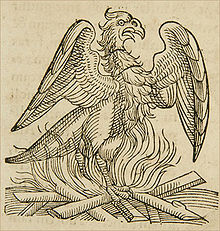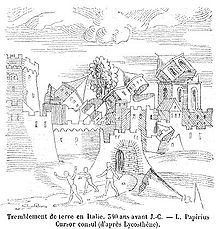- Conrad Lycosthenes
-
 Conrad Lycosthenes
Conrad Lycosthenes
Conrad Lycosthenes (Conrad Wolffhart) (1518 — 1561) was an Alsatian humanist and encyclopedist.
Contents
Life
He was born in Rouffach in Alsace on August 8, 1518, the son of Theobald Wolffhart and Elizabeth Kürsner, sister of the Protestant theologian Conrad Pellicanus. He later changed his German name, Wolffhart, to the humanist name Lycosthenes.
From 1535 to 1539, Conrad studied philosophy in Heidelberg. In 1542, he left Heidelberg for Basel where he began teaching Grammar and Dialectics. In 1545, at the age of 27, he became Deacon in the Church of Saint-Leonard. On December 21, 1554, he suffered from hemiplegia and lost the ability to use his right hand. He learned to write with his left hand and continued his literary works until his death from apoplexia on March 25, 1561, at the age of 43. In the meantime he had married Chretienne Herbster, sister of the famous Basel book printer Johannes Oporinus (Oporin) and widow of Leonard Zwinger, father of Theodor Zwinger, author of the Theatrum vitae humanae.[1],
Works
 A phoenix from Apophthegmata
A phoenix from Apophthegmata
He belongs among the numerous polyhistors of the 16th century. He mastered Latin and Greek and was particularly fond of curiosities. His varied works include editions, translations and compilations.
- 1547 Commentaries on De viris illustribus, Basel, in-8°.
- 1551 Elenchus scriptorum omnium, Basel, in-4°.
- 1551 Gnomologia ex AEneae Sylvii operibus collecta, Basel, edit.1555, in 4°.
- 1552 Iulii Obsequentis Prodigiorum liber, ab urbe condita usque ad Augustum Caesarem, cujus tantum extabat Fragmentum, nunc demum Historiarum beneficio, per Conradum Lycosthenem Rubeaquensem, integrati suae restitutus. Basilae, ex off. Ioannis Oporinii, Anno Salutis humanae, M.D.LII. Mense Martio, in-8°.
- 1552 J. Ravisii Textoris officina, Basel.
- 1555 Apophthegmatum sive responsorum memorabilium, ex probatissimis quibusque tam graecis quam latinis auctoribus priscis pariter atque recentioribus, collectorum Loci communes ad ordinem alphabeticum redacti, Basel, in fol.
- 1557 Epitome Stobaei Sententiarum, Basel, in -8°.
- 1557 Parabolae sive similitudines ex var. auct. ab Erasmo collectae, in locos communes redactae, Berne in-4°; Basel, 1575, 1602, in-8°.
- 1557 Prodigiorum ac ostentorum chronicon, quae praeter naturae ordinem, et in superioribus et his inferioribus mundi regionibus, ab exordio mundi usque ad haec nostra tempora acciderunt. Basileae per H. Petri, fol, 672 p. fig. et pl. (64).
- 1559 Dom. Brusonii Facetiarum lib. VII, Basel, in-4°.
- 1560 Regula investigationis omnium locorum in tabula Helvetiae contentorum, Basel, in-4°.
Literature
- Lucio D. Brusoni, An extracte of examples, apothegmes, and histories Collected out of Lycosthenes, Brusonius and others, London 1572
- Jürgen Beyer, 'Lycosthenes, Conrad', in Enzyklopädie des Märchens. Handwörterbuch zur historischen und vergleichenden Erzählforschung, vol. 8 (Berlin & New York: Walter de Gruyter, 1994-96), coll. 1323-6
External links
Notes
- ^ Haag, E. (1859). La France Protestante ou Vies des Protestants Français, Tome IX, Paris: J. Cherbuliez, page 542.
Categories:- 1518 births
- 1561 deaths
- People from Haut-Rhin
- German Renaissance humanists
Wikimedia Foundation. 2010.

